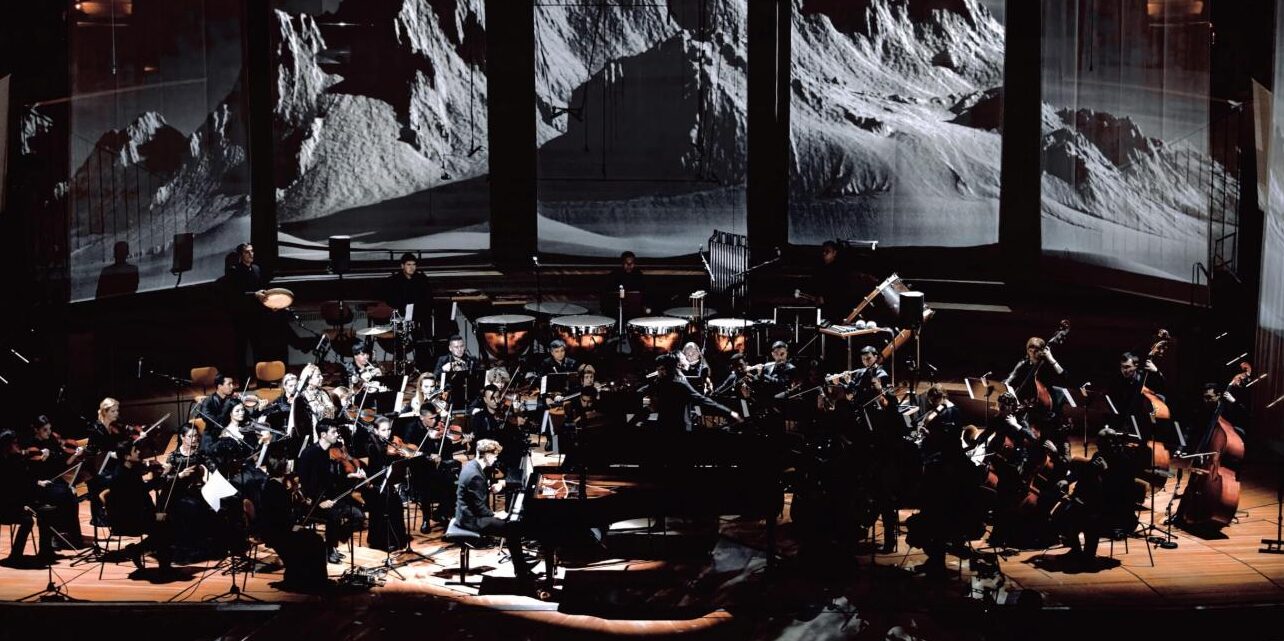Kirill Richter is a young Russian composer and pianist. His concert at the Coliseum was described as being “to premier his new composition The Sands of Time”.
This piece provided an impressive climax at the end of the second half of the performance. It followed a first half that comprised a series of short items including Mechanisms and In Memoriam played by the Richter Trio and a second half where Alibek Kabdurakhmanov conducted the National Symphony Orchestra of Uzbekistan in a series of larger-scale but short works by Richter – including Faith of our Fathers. His music is perhaps in the borderland between John Adams and Karl Jenkins but with Richter himself at the piano and with the full power of the splendid National Symphony Orchestra of Uzbekistan to call upon, this was a gripping evening with some memorable highlights. That it did not quite live up to the hype of the advertising blurb – “unique, dazzling, and deeply immersive” – was not the fault of the performers.
For the first half Richter was on stage as part of his trio. The other two members are Alena Zinovieva on violin and August Krepak on cello – both virtuosos in their own rights and all three with that almost psychic connection that comes from playing together over a long period of time. The music was often based on simple themes laid down by Richter with driving rhythms added and embellished by Zinovieva and Krepak. Mechanisms, for example, does conjure up the aura of a factory where the machinery dominates and is almost out of control – and the spectacular visuals do intensify the music’s impact. The back of the Coliseum stage was filled with huge video screens onto which were projected moving images, often of natural features – mountains, seas, clouds, rainstorms. Certainly beautiful to look at but hardly deeply immersive – and, for those of us who remember Pink Floyd in the seventies, nothing startlingly original.
When the curtain rose for the second half, behind the piano we had the massed forces of the Uzbekistan Symphony Orchestra. The music was largely similar with Richter laying down the themes with the orchestra doing the work previously carried by the trio – though Zinovieva and Krepak were still on stage at the first desks of the violins and the cellos. Conductor Alibek Kabdurakhmanov was a dynamic presence in this session though I would have preferred to see him at the front of the stage and not half-hidden behind Richter’s piano.
The climax of the evening was The Sands of Time and this piece brought to the stage Nodira Pirmatova, an Uzbek singer with a marvellous voice and tremendous stage presence. She is a celebrated exponent of the traditional music of Uzbekistan – I admit to never having heard of her before but I have, since the concert, visited websites with examples of her artistry and she is very special. Since this was a one-night-only concert, I will also add that, if any readers are interested in hearing music from the Richter trio, there is also on the internet a recording of a concert that they gave at the Zaryadie Hall in Moscow in April 2021.
There was a tangible sense of expectation at the Coliseum. The Uzbek community in London had turned out in force and the performance by their national symphony orchestra fully justified the excitement. Richter is an interesting composer in the early stages of what one hopes will be a long and creative career. This was a fine evening of music. If he comes to the UK again, he will be well worth seeing.
Composer and Pianist : Kirill Richter
Conductor: Alibek Kabdurakhmanov
Performers: Richter Trio, National Symphony Orchestra of Uzbekistan and Nodira Pirmatova
Running time: 2 hrs 30 Mins
Date: 11 September 2024

